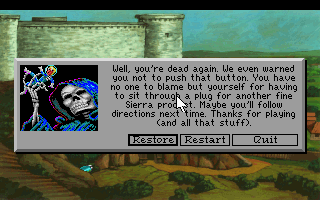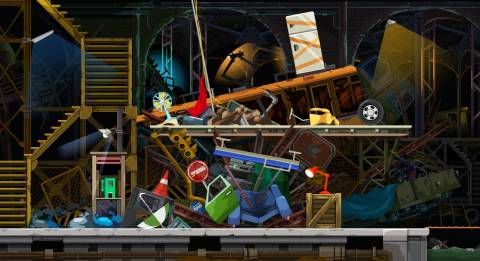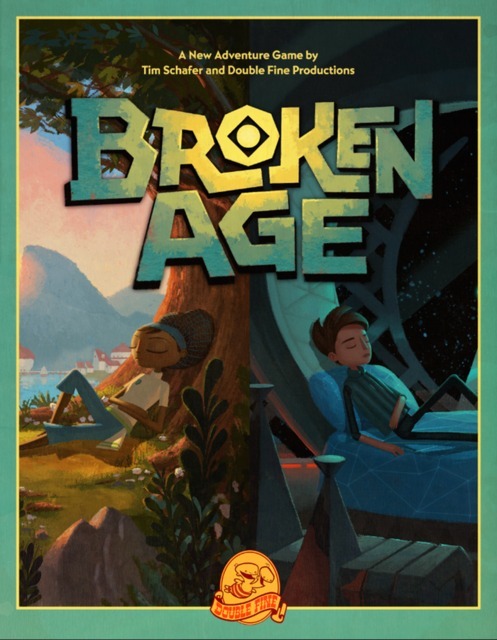That's a sort of Engrishy title, but it should suffice for what I'm about to discuss.
Adventure games have been slowly crawling back from obsolescence in recent years and nothing has quite emphasized this comeback like the recent remarkably successful Kickstarter campaign for a new Double Fine Adventure Game from adventure auteur Tim Schafer. Clearly we as a global community are not yet done with pointing and clicking.

Unlike many genres which are happy to invoke the same trappings and tropes over and over with slightly better graphical fidelity, the adventure game genre is continually reinventing itself. From its early challenging text-parser driven narratives, to the snarky arbitrariness of Sierra's Quests, to the goofy, low-stress charms of LucasArts and the many smaller studios throughout that timeline with their own stories to tell, the genre went from strength-to-strength as the designers carefully considered what made a good story and balanced that with what made a good game. Then - and forgive me if I've gone a little too esoteric with this analogy - like the horrible fish-salamander abominations from the universally-despised Voyager episode "Threshold", it evolved a little too quickly/stupidly and led to the many compelling fiascos of the FMV adventure game era, including but not limited to: demonic rapes, tiny Jim Belushi flying an airplane and cyber-Walken blowing up your "C-Space" avatar. The genre died of embarrassment soon after.
These days we have all manner of adventure games making the rounds. Some, Indie hits like Gemini Rue and Spanish homages like Runaway and The Next Big Thing for example, are happy to continue where the classic 2D animated adventure games left off, before the whole business got a bit hairy. One could even make it a point that any game with a strong guiding narrative that can only move forward after solving environmental puzzles, such as Portal or Limbo, could be considered adventure games as well. Hell, people make that case for the Legend of Zelda too, though that's perhaps a contentious blog for another day.
After all that senseless rambling, I'll now get to the heart of this blog: The episodic adventure game. Now that term might immediately bring to mind the TellTale franchises for a lot of you, but that's not actually what I'm talking about. At least not entirely. What I mean are the games that give you a series of self-contained puzzles to solve, with each solution continuing the story while completely changing the environment and inventory for the next chapter. Games like Ghost Trick and Zack & Wiki, to name but two examples.
The strength of this format is that it greatly alleviates the usual frustration with obtuse adventure games - expediting the "try everything on everything to proceed" tactic when stuck. As older adventure games were balanced to increase the difficulty by adding more and more moving parts (or "innumerable inventory items", "barely visible background components that can be interacted with" and "rarely helpful NPCs" as the case may be) in more areas, it also tended to make progress maddeningly indiscernible, which in many cases was already exacerbated by being strictly defined by the sort of incomprehensible dream logic you'd expect from inter-dimensional beings who have had our reality explained to them via interpretative dance. With a single screen of objects to tinker with before you move on forever to pastures new, you're far less likely to encounter that sort of aggravation. Likewise, the narrative will also often benefit from following an episodic format - like a TV show - that gradually reveals more of the plot and the characters to the player in bite-sized morsels.

Ghost Trick: Phantom Detective specifically, which I recently played, has plenty going for it already: Stylistic art that evokes Gallic studio Delphine's older rotoscoped adventure games like Out of This World and Flashback, a brilliant gameplay conceit that is fully exploited by the varied puzzles, a memorable cast of eccentrics and a cracking mystery plot that taps into the thoughts and motivations of several different characters at once. However, its greatest boon is that each chapter is split up into single areas (usually several rooms, which can be surveyed by passing through floors and walls) with a finite list of objects to possess and manipulate and clearly defined objectives with not-so-clearly defined solutions. As challenging as the game's puzzles might be, especially with how many require crackerjack timing with gestures and movements you may have initially missed, the smaller scale means you never stay bamboozled for too long.
Similarly, many industry critics lauded TellTale's episodic approach as a means to provide a new pricing structure that allows dissatisfied consumers to opt out relatively cheaply as well as immediate fans to subscribe for the whole affair at perhaps more than a singular title might cost, yet I feel - again - that the true strength of the format has always been that manner of beneficial simplification: A sequence of smaller, manageable worlds that can tell their own self-contained stories, but will also contribute to a larger, overarching narrative that covers the whole season of episodes.
So we come back to Double Fine's as yet untitled Adventure Game. While there are plenty of reasons to stick with the older LucasArts format, given that's what many of the donors are probably hoping for without perhaps realising that nostalgia is often equated to rose-tinted glasses for a reason, I wonder if it can't benefit more from an episodic style instead - provided, of course, we wouldn't need to wait much longer than we must to play the whole thing. Double Fine already knows how to craft a game like that, as evidenced by the sublime - if all too brief - Stacking. It'll be interesting to see how this new game will turn out, given everything that's transpired within the adventure game genre in the many years since Tim Schafer's career-making masterpieces. I guess we should trust that those guys know what they're doing, ultimately. They've earned it. And you've all earned some stickpeople comics for reading this far, thereby masterfully segueing to...
BONUS COMICS!
Legend of Zelda: Skyward Sword

Ghost Trick: Phantom Detective


Log in to comment